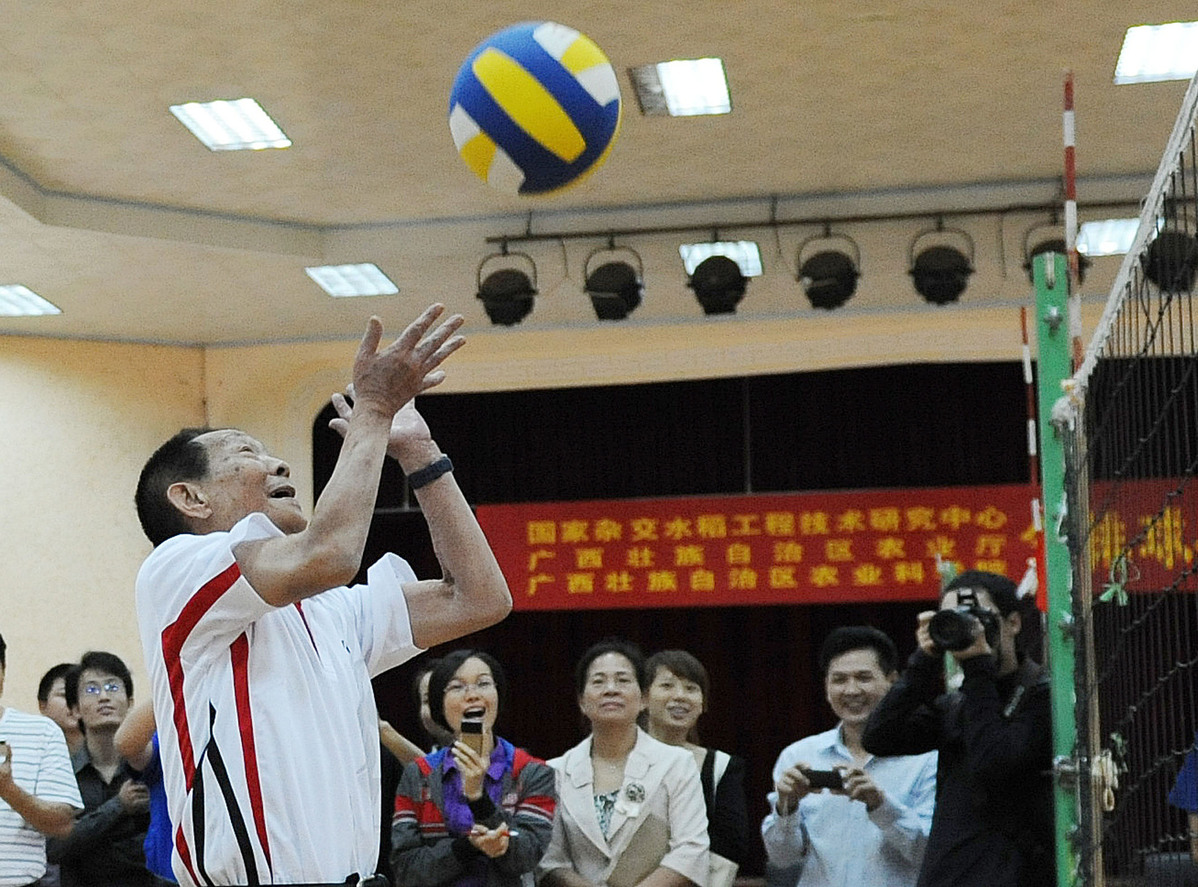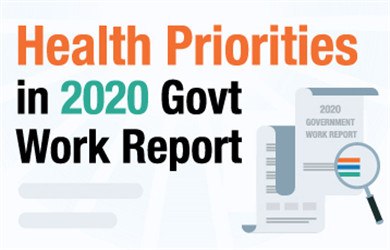Tributes flood in for 'father of hybrid rice', who died at 91

Yuan plays volleyball at age 81. [Photo by Yu Xiangquan/For China Daily]
Dreaming of rice
Born in 1930 in Beijing, and raised in an era of wars and famine, Yuan witnessed the despair of people displaced from their hometowns and losing the land they lived on.
When he applied for university, he decided to study agriculture, although his mother thought such work would be tough and exhausting.
In an article published in People's Daily in 2019, Yuan wrote, "I was fond of agriculture and insisted on studying it at the time, telling my parents that having enough food was people's upmost priority and that they couldn't live without filling their stomach. Eventually, my parents were persuaded."
After graduation, Yuan was assigned to teach at an agriculture school in a remote town in Huaihua, Hunan province. He was prepared to make contributions to the development of the country by spreading agricultural knowledge and techniques.
However, a few years later, from 1959-61, the nation experienced food shortages.
"That made me start to think that the development of our country relied greatly on food security and that I needed to work to let Chinese people have enough food," he wrote.
Yuan's research results have been used throughout the country since the mid-1970s, and have greatly increased national rice yields.
In the decades that followed, he led his team to conduct research on super hybrid rice, achieving goals of harvesting 10.5 tons, 12 tons, 13.5 tons and 15 tons of rice per hectare in 2000, 2004, 2011 and 2014.
In 2017, the average output of hybrid rice per hectare in China reached 7.5 tons, while globally it was 4.61 tons.
Yuan appears in the movie Yuan Longping, which premiered in 2009, talking with a foreign reporter about a dream he had.
"Several years ago, I had a dream. I saw my super hybrid rice plant as high as sorghum, the panicle (clump) as large as a broom, and the grain as big as peanuts. I was very happy to rest under the panicle with my assistant," Yuan said in English.
"As long as I live, I'll never stop pursuing and dreaming about super hybrid rice."
In recent years, Yuan and his team started to research a salt-tolerant crop, known as "sea rice", with a research and development center being set up in Qingdao, Shandong province, in 2016.
Public data show that China has about 100 million hectares of saline-alkali soil and about one-fifth of this land can be developed and cultivated. Yuan believed if the land was covered with high-yielding sea rice, output prospects would be bright.
Benefiting the world
Developing hybrid rice to benefit people globally was another of Yuan's lifelong pursuits. To realize this ambition, he was committed to promoting hybrid rice internationally for a long time.
To date, this rice has been planted in large areas of India, Bangladesh, Indonesia, Vietnam, the Philippines, the US, Brazil, Madagascar, among other countries.
According to a report by consultancy Future Market Insights, hybrid rice seeds are being cultivated on 4.5 million hectares of land in Asian rice-producing countries, excluding China.
In the 1980s, agricultural centers in the Philippines and Vietnam started collaborating with the International Rice Research Institute to develop hybrid rice varieties.
According to studies, hybrid rice out-yielded existing inbred varieties by an average of 21 percent and 17 percent respectively in Vietnam and the Philippines.
The Philippines is a key location for joint research with China on hybrid rice varieties, thanks to the establishment of the Philippine-Sino Center for Agricultural Technology.
Hybrid rice varieties are grown on more than 10 percent of arable land in the Philippines, boosting the country's rice output by 2.4 million tons a year.
According to Philippine government statistics, this has helped feed 15 million people, or 14 percent of the country's population, based on an annual per capita rice consumption of 160 kilograms.
In Vietnam, Chinese hybrid rice was introduced into the Red River Delta region in the 1990s. According to the Access to Seeds Index 2019 published by the World Benchmarking Alliance, Vietnam imports 70 percent to 80 percent of the formal seed used, including hybrid rice seed. China is the main supplier of hybrid rice seed to Vietnam.
Agricultural research institutes in Vietnam have also taken part in activities held by China in Southeast Asian countries, such as demonstrating and promoting tropical hybrid rice projects.
In 2015, Yuan visited Cambodia to promote hybrid rice, with the aim of planting 300,000 hectares of this crop in the country within three years, according to Xinhua.
When meeting with then-Cambodian deputy prime minister Yim Chhay Ly, Yuan said he was confident of increasing Cambodia's rice output from three tons per hectare to 10 tons within three years.
For more than a decade, the World Food Prize Foundation has placed young US agriculture students on Borlaug-Ruan International Internships at Yuan's center in Changsha.
Stinson, the foundation's president, said she expected the US-China cooperation program to resume in person, after having run it virtually since last year because of the COVID-19 pandemic.
"It's my hope to continue this longstanding powerful relationship between the World Food Prize Foundation and many researchers and leaders in China," she said, adding that the foundation considers the partnership "very much" part of Yuan's legacy.
President Emeritus of the World Food Prize Foundation, Kenneth M. Quinn, who knew Yuan for more than two decades, said he was told of the scientist's death by a tourist agency staff member from Sanya, who sent him a WeChat message.
"With the passing of Professor Yuan Longping, China and the world have lost one of the greatest agricultural scientists on our planet, and I have lost a great friend," Quinn said.
"I think, 100 years from now, people will still be talking about Yuan Longping in China and the rest of the world. That's how significant his achievements were."
Quinn, president of the WFP Foundation from 2000 to early last year, said that when Yuan visited Des Moines, Iowa, in the US for the 2004 World Food Prize, he went to the airport to pick him up.
"I was distracted by a call, and when I turned around, Professor Yuan was gone-he was surrounded by Chinese Americans who had all come to meet him as well."
Quinn learned during his travels around China that everyone in the country knew who Yuan was and what he had done.
"On every occasion, every person I spoke with-servers in restaurants in Shenzhen (Guangdong province), hotel staff in Shijiazhuang (Hebei province) and refreshment vendors on high-speed trains-all knew his name and that Yuan Longping had made amazing accomplishments in rice production," he said.
Quinn drew similarities between Yuan and Norman Borlaug, winner of the Nobel Peace Prize in 1970 for his work in global agriculture, and who created the World Food Prize. Quinn worked and made friends with both men.
"Like Dr. Borlaug, Professor Yuan was incredibly humble, never seeking fame or adulation, instead focusing only on hard work and results that could help eradicate poverty and lift people out of hunger," Quinn said.


